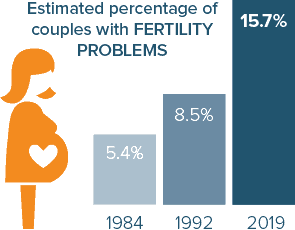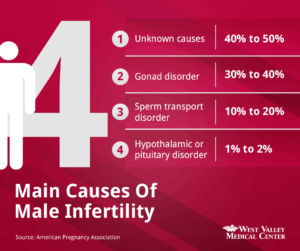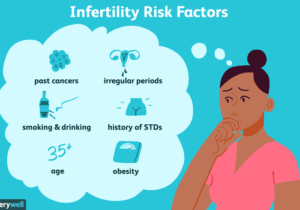If you and your partner are struggling to have a baby, you’re not alone. In the United States, 10% to 15% of couples are infertile. Infertility is defined as not being able to get pregnant despite having frequent, unprotected sex for at least a year for most couples.
Infertility may result from an issue with either you or your partner, or a combination of factors that prevent pregnancy. Fortunately, there are many safe and effective therapies that significantly improve your chances of getting pregnant.
The main symptom of infertility is not getting pregnant. There may be no other obvious symptoms. Sometimes, women with infertility may have irregular or absent menstrual periods. In some cases, men with infertility may have some signs of hormonal problems, such as changes in hair growth or sexual function.
Most couples will eventually conceive, with or without treatment.
Risk Factors to being prone to this diagnose:
Age. Women’s fertility gradually declines with age, especially in the mid-30s, and it drops rapidly after age 37.
Tobacco use. Smoking tobacco or marijuana by either partner may reduce the likelihood of pregnancy.
Alcohol use. For women, there’s no safe level of alcohol use during conception or pregnancy. Alcohol use may contribute to infertility. With men it can decrease sperm count.
Being overweight. Among American women, an inactive lifestyle and being overweight may increase the risk of infertility. Sperm count for men can be affected by low sperm count.
Being underweight. Women at risk of fertility problems include those with eating disorders, such as anorexia or bulimia.
Exercise issues. A lack of exercise contributes to obesity, which increases the risk of infertility. Less often, ovulation problems may be associated with frequent strenuous, intense exercise in women who are not overweight.
When to take a trip to the doctor:
You probably don’t need to see your health care provider about infertility unless you have been trying regularly to get pregnant for at least one year. Women should talk with a care provider, the earlier the better, but if you haven’t yet go if you are:
- age 35 or older and have been trying to conceive for six months or longer
- over age 40
- having irregular or absent periods or very painful periods
- with known fertility problems
- diagnosed with endometriosis or pelvic inflammatory disease
- have had multiple miscarriages
- have undergone treatment for cancer
- have a history of endometriosis
- have a history of fallopian tube damage or blockage
- have a history of cancer and its treatment
- history of pelvic adhesions
Men should talk to a health care provider if they have:
- A low sperm count or other problems with sperm
- A history of testicular, prostate or sexual problems
- Undergone treatment for cancer
- Small testicles or swelling in the scrotum
- Others in your family with infertility problems
Know for many infertility can be treated with medicine, surgery, intrauterine insemination, or assisted reproductive technology. So go to the doctor if you are having problems and they can give you direction.



